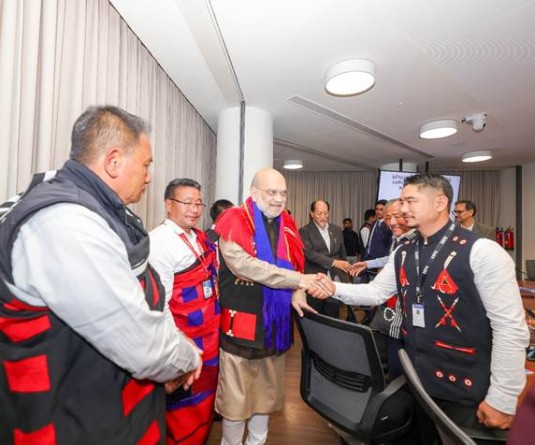The penalist during the consultative meet at Peace Centre, 7th Mile St Joseph Campus, Chümoukedima on August 27.
Chümoukedima, August 27 (MExN): ‘Strong leadership, initiation of changes and bridging the gaps to help the public voice heard’ were the recurring ideas stressed on by the panelists during the consultative meet on ‘the role of civil society in peace building’ organized by Peace Channel in collaboration with NESRC and NEISSR at Peace Centre, 7th Mile St Joseph Campus, Chümoukedima on August 27.
Peace Channel Desk in a press release stated that Rev Dr Mazie Nakhro, Director, Bright Horizon, Chümoukedima, Doichong Phom, Ambassador of Beti Bachao Beti Padhao, Longleng district, and Social & Cultural Secretary, Eastern Naga Women Organization (ENWO) and Rev Fr Dr Walter Fernandes, Director, North Eastern Social Research Centre (NESRC), Guwahati, Assam spoke on the various aspects of peace-building as the panelists. The discussion was moderated by Rev Fr Chacko Karinthayil, Director, Shalom Rehabilitation Centre, Chümoukedima.
Dr Mazie Nakhro shared on the need of a strong centralized leadership with not only physical and political strength, but also of moral strength. He stated that many divisions arise in Nagaland due to different level of crises at the national, state and village level. He stressed that if there is a strong leadership with strong vision there can be a solution and we won’t be in this condition which we are presently living in.
Pointing out four pillars that plays different role in peace-building in a society i.e. Government, Church, Civil Society and Media, Rev Dr Mazie Nakhro stated that people are searching for a domain that provides significance, security and recognition and just mere power sharing among nation or political space is not enough to bring peace. Lack of strong centralized leadership to lead the people is one of the main problems that Naga society is facing, he added.
Doichong Phom emphasized on six core points: positive impact of civil society and how it should empower all the people to speak up for their rights, be an initiator for the key changes in the society; it should mobilize and represent people and their key issues. She cited the example of how Naga freedom Movement has been segregated, leading to division, instead of freedom. She also spoke on the different forms and nature of violence faced by women and called upon the organizers and likeminded organization to initiate similar program in each district of Nagaland to spread the need of dialoging on problems that trouble our society.
Dr Walter Fernandes stressed that the role of civil society is not at the top level, but it is with the people as a bridge or the support of the people to help them voice out. Civil society should also challenge the top tier by pointing out the issues and the needs of the people, he said. Peace cannot be talked about, without the people’s participation, he added.
He highlighted on the There need to create the atmosphere to where there is absence of fear, to be strong, unity based on diversity, unity based on justice, unity based on pluralism and peace based on justice.
In his welcome note, Rev Fr Dr CP Anto, Director, Peace Channel & Principal, NEISSR spoke on the need of addressing conflict at all levels through an inclusive approach. The panel discussion was followed by Q&A session, followed by a group discussion among the participants on “Role of Youth in bridging the Gaps among Naga Civil Societies”. The seminar was chaired by Zhovino Kechu, MSW Student NEISSR. Vote of thanks was delivered by Susan Lotha, Liaison Officer, Peace Channel & NEISSR followed by benediction by Dr Toli H Kiba, Assistant Professor, NEISSR.






